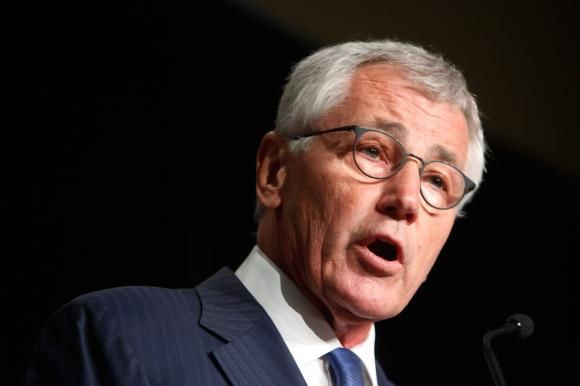Hagel Defends Ebola Quarantines For Military As 'Science-Oriented'

U.S. Secretary of Defense Chuck Hagel is defending his new policy that military personnel be quarantined for 21 days after deployments fighting Ebola in West Africa as science-based and “thoroughly reviewed by health care professionals.” The remarks defend a policy that health experts say clashes with the Obama administration’s strong opposition to imposing mandatory quarantine periods on asymptomatic health workers and other civilians returning from the region.
“Science does dictate that there’s a 21-day monitoring period,” Hagel said during a wide-ranging press conference Thursday afternoon in Washington, D.C. “It was a smart, wise, prudent, disciplined, science-oriented decision … Ebola is one of those issues everyone is paying attention to; there is disagreement across the board on every decision made.”
Hagel also touched on the military’s efforts to defeat the Islamic State group, commonly known as ISIS, in Iraq and Syria when responding to a question about whether the U.S. campaign against ISIS is combining with the terror group’s ongoing assault on Syria’s moderate opposition in a way that helps Syrian President Bashar al-Assad, whom the U.S. government still hopes to see unseated. But he emphasized the complicated nature of the situation in Syria and said that the U.S. military campaign against ISIS will require long-term commitment, calling it a “multiyear effort” to defeat the group.
“Assad derives some benefit from that, of course,” Hagel said. “What we’re talking about is a longer-term strategy … to stabilize that part of the world.”
The military is also beginning to see some of its plans for the fight against Ebola come to fruition, he and Gen. Martin Dempsey, chairman of the Joint Chiefs of Staff, said at the press conference. Hagel said that 1,100 of the up to 4,000 troops expected to be deployed to West Africa have already arrived there.
“They’re making a difference in West Africa by completing up to 17 Ebola treatment centers [there], the first of which was completed over the weekend,” Hagel said. “The 25-bed hospital they have been building in West Africa will be fully operational by next week.”
Dempsey said the decision to quarantine soldiers after their deployments fighting Ebola was made as a result of the concept that theirs is a unique situation because they will be on the ground in West Africa for six-month tours, “longer than anyone else” in large numbers. He also called it “consistent the way we adapt our re-adaptation processes” for troops returning from any military deployment.
“We did factor in science. Physics is the science we factored in,” he said, adding later, “This is about a major military operation and big things on a global scale, but we took a conservative approach and we’re going to reassess it in 45 days.”
© Copyright IBTimes 2025. All rights reserved.




















